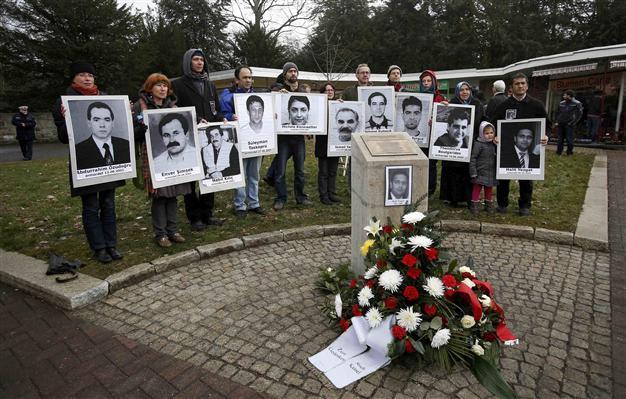Germany's Constitutional Court backs foreign media access to neo-Nazi trial
BERLIN - Reuters

People hold pictures of the victims of the National Socialist Underground (NSU) group at the memorial to Halit Yozgat in Kassel April 6, 2013. Yozgat a Turkish internet cafe owner Halit Yozgat was murdered by the ultra-right wing extremist group NSU in his shop in Kassel on April 6, 2006. REUTERS photo
Germany's Constitutional Court ruled on April 11 that foreign media should have access to the trial of a suspected neo-Nazi in connection with 10 racist murders, including of eight ethnic Turks, after a Turkish newspaper filed a complaint.
The Munich court where the trial is due to start on April 17 had allocated 50 seats to all media on a first-come-first-served basis, but, in the event, none went to Turkish journalists.
Turkish newspaper Sabah filed a complaint with the Constitutional Court in Karlsruhe, saying that the Munich court's decision not to guarantee seats to Turkish media had violated its right to equality.
"(The Munich court should) provide an appropriate number of seats to representatives of the foreign media with a special connection to the victims of the accused," the Constitutional Court said in a statement.
"It would be possible to open up not fewer than three places for an additional contingent (in the small courtroom)," it said, adding that it was for the court to decide how to allocate the extra seats.
The case provoked anger in Turkey and embarrassment for the German authorities, already under fire over botched investigations into the killings and for their failure to consider they may have had a racist motive.
"I am very relieved by the Karlsruhe verdict," German Foreign Minister Guido Westerwelle said.
Sabah, which along with other Turkish media and representatives of Germany's large ethnic Turkish community had accused the Munich court of insensitivity, also hailed Friday's ruling.
"We are also happy of course that because of Sabah's complaint other Turkish media can attend ... This is a historic trial," the paper's deputy chief editor for Europe, Ismail Erel, told Reuters Television.
A previously unknown neo-Nazi cell, the National Socialist Underground (NSU), carried out the murders of the eight Turks, a Greek and a policewoman over a period from 2000 to 2007.
The focus of the trial will be a 38-year-old woman, Beate Zschaepe, accused of being an NSU founder member and of involvement in the murders. Four suspected male accomplices are also on trial.
The existence of the cell came to light by chance when two members committed suicide after a botched bank robbery and when Zschaepe allegedly set fire to an apartment used by the gang.
At a memorial ceremony for the victims last year, Chancellor Angela Merkel begged the families for forgiveness for Germany's failings and pledged to take action against neo-Nazis.
